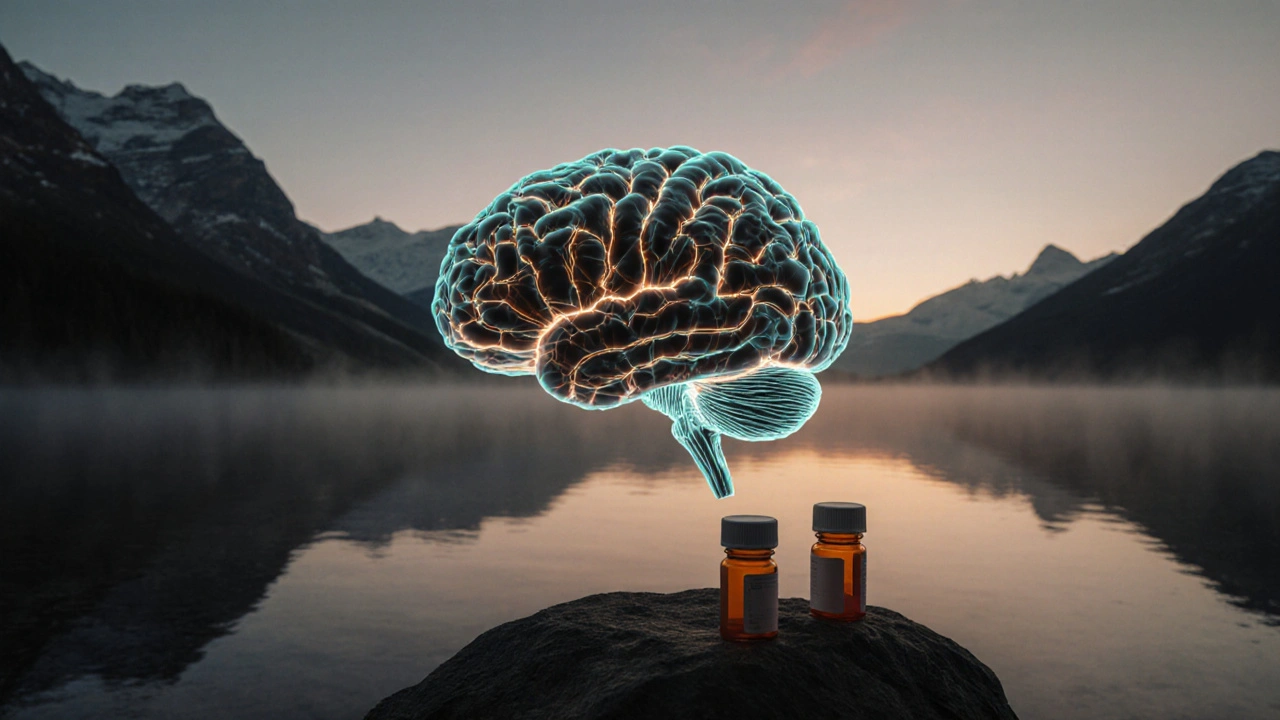Depression & Libido Impact Checker
Answer the following questions to understand how depression might be affecting your libido and what steps you can take:
TL;DR
- Depression often reduces libido by altering brain chemistry and energy levels.
- Serotonin‑boosting antidepressants (especially SSRIs) can further suppress sexual desire.
- Poor sleep, stress, and low testosterone amplify the problem.
- Therapy, lifestyle tweaks, and medication switches can restore interest.
- Seek professional help if loss of desire persists for more than a few weeks.
Ever notice how a low mood can also drain your sex drive? That’s not a coincidence. When depression is a mood disorder marked by persistent sadness, loss of interest, and fatigue, many people experience a noticeable dip in sexual desire. Understanding why this happens can help you break the cycle and get back to feeling like yourself again.
What Is Depression?
Depression, clinically known as major depressive disorder, affects roughly 264million adults worldwide. It’s more than just feeling sad; it changes how the brain processes emotions, motivation, and even bodily sensations. Common symptoms include hopelessness, trouble concentrating, disrupted sleep, and a lack of pleasure in activities that once felt rewarding.
Why Libido Takes a Hit
Sexual desire, or libido, is a complex dance between hormones, neurotransmitters, and psychological state. When depression steps onto the floor, it pulls the rug from several of these partners at once:
- Energy Drain - Fatigue makes any extra effort feel overwhelming.
- Negative Self‑Image - Low self‑esteem can spark anxiety around intimacy.
- Brain Chemistry Shift - Depression reduces dopamine (the “reward” neurotransmitter) while often increasing serotonin, which can dull sexual arousal.
Key Biological Players
Here are the main entities that link depression to a lower sex drive:
- Serotonin is a neurotransmitter that regulates mood, appetite, and sleep. Antidepressants that raise serotonin levels can unintentionally suppress libido.
- Dopamine is the brain's motivation and reward chemical. Depression often lowers dopamine, which directly reduces sexual interest.
- Testosterone is a hormone that fuels sexual desire in both men and women. Chronic stress and poor sleep, common in depression, can lower testosterone levels.
- Stress Hormone (Cortisol) is released during prolonged stress, interfering with sexual arousal pathways.

Medication Matters: How Antidepressants Influence Libido
While antidepressants are lifesavers for many, their impact on sexual function varies. Below is a quick comparison of the most prescribed classes.
| Class | Typical Drug | Mechanism | Libido Effect |
|---|---|---|---|
| SSRIs | Fluoxetine | Boosts serotonin reuptake inhibition | Often lowers desire (30‑60% report) |
| SNRIs | Venlafaxine | Increases serotonin & norepinephrine | Mixed; moderate decrease in some users |
| TCAs | Amitriptyline | Blocks reuptake of multiple neurotransmitters | Can cause sexual side‑effects, but less common than SSRIs |
| MAOIs | Phenelzine | Inhibits monoamine oxidase, raising all monoamines | Variable; some experience increased desire, others not |
| Atypical (e.g., Bupropion) | Bupropion | Targets dopamine & norepinephrine | Often improves libido or has neutral effect |
If you’re on an SSRI and notice a drop in libido, talk to your prescriber. Switching to a dopamine‑focused option like bupropion can restore desire for many patients.
Non‑Pharmacological Strategies to Reignite Desire
Medication tweaks aren’t the only answer. Lifestyle and therapy play a huge role:
- Exercise - Regular aerobic activity raises dopamine and testosterone, while also cutting cortisol.
- Sleep Hygiene - Aim for 7‑9 hours; deep sleep restores hormone balance.
- Mind‑Body Practices - Yoga, meditation, or tai chi reduce stress hormones that sabotage libido.
- Cognitive‑Behavioral Therapy (CBT) - Helps reframe negative thoughts about sex and rebuild confidence.
- Couple Communication - Open talks about desires and fears can lower performance anxiety.
When to Seek Professional Help
If low desire persists for more than a month, or if it’s causing strain in your relationship, it’s time to act. Here’s a quick decision tree:
- Are you feeling persistently sad, empty, or hopeless? → Consider a mental‑health evaluation.
- Is your medication a possible culprit? → Ask your doctor about dosage changes or alternatives.
- Do you notice physical symptoms (e.g., low testosterone, chronic fatigue)? → Request blood work to rule out medical causes.
- Is relationship tension adding stress? → A therapist or couples counselor can mediate.
Early intervention can prevent a downward spiral and restore both mood and intimacy.
Quick Checklist: Restoring Libido While Managing Depression
- Track mood and desire daily for two weeks to identify patterns.
- Schedule a medical review of your antidepressant regimen.
- Add 30minutes of moderate exercise most days.
- Prioritize 7‑9 hours of sleep; avoid screens an hour before bed.
- Practice a stress‑relief technique (breathing, meditation) for 10 minutes daily.
- Talk openly with your partner about expectations and concerns.
- Consider therapy (CBT or sex therapy) if anxiety about performance persists.
Frequently Asked Questions
Can depression cause a complete loss of sexual interest?
Yes. In severe cases, the combination of low energy, negative self‑image, and hormonal shifts can lead to a near‑total loss of desire. This is often called "sexual aversion" and should be discussed with a health professional.
Do all antidepressants lower libido?
Not all. SSRIs and SNRIs have the highest rates of sexual side‑effects. Atypical agents like bupropion or certain tricyclics tend to have a milder impact, and some users even report improved desire.
Is low testosterone always the cause of reduced desire in depression?
No. While low testosterone can contribute, many people with normal hormone levels still experience low libido due to brain‑chemical changes. Testing helps identify if hormones are part of the picture.
Can lifestyle changes alone improve both mood and libido?
For mild to moderate depression, regular exercise, adequate sleep, and stress‑reduction techniques can boost dopamine, lower cortisol, and often restore interest in sex. However, severe depression usually needs medication plus lifestyle support.
When should I consider a hormone test?
If you’ve noticed persistent low desire, especially alongside fatigue, hair loss, or mood swings, ask your doctor for a full panel that includes testosterone, thyroid hormones, and cortisol.

Uju Okonkwo
Hey there, thanks for sharing this thorough guide. It’s really helpful to see how depression can affect libido from both a mental and hormonal angle. One thing I’d add is the importance of tracking both mood and desire in a simple journal-you’ll start to see patterns. Also, encouraging your partner to join you in light exercise can boost dopamine for both of you. Remember, progress can be incremental, so celebrate small wins along the way.
allen doroteo
Wow, this article is like a rollercoaster of doom n gloom, my brain is melting!
Corey Jost
While the article does a decent job outlining the biochemical pathways, it glosses over the fact that not every depressed individual will experience a uniform dip in libido. The relationship between serotonin and sexual desire is far more nuanced than a simple cause‑and‑effect. For instance, some patients on SSRIs report an initial increase in sexual satisfaction due to reduced anxiety. Moreover, dopamine levels can be modulated by diet, not just medication, which the piece barely mentions. The emphasis on testosterone overlooks the role of cortisol, which, when chronically elevated, can suppress both mood and sexual function. In addition, the sleep hygiene section fails to address circadian rhythm disorders that are prevalent in depression. It would have been useful to reference recent meta‑analyses that quantify the prevalence of sexual side‑effects across different antidepressant classes. The suggestion to switch to bupropion is sound, yet the article neglects the fact that bupropion can itself cause insomnia, potentially worsening the problem. Also, the piece does not discuss the impact of underlying medical conditions such as hypothyroidism, which can masquerade as depressive symptoms. The checklist at the end, while practical, assumes the reader has access to a healthcare professional, which is not always true. A more robust approach would include self‑guided cognitive techniques that have been validated in randomized trials. Furthermore, the article’s tone seems to assume a heterosexual, cisgender audience, ignoring the variations in libido experiences among LGBTQ+ individuals. The bio‑feedback methods mentioned, like yoga, deserve a deeper dive, especially regarding their effect on the parasympathetic nervous system. Lastly, the piece could benefit from acknowledging cultural attitudes toward sexuality, which heavily influence how depression manifests in sexual desire. In sum, while the article is a good starting point, a more comprehensive, evidence‑based, and inclusive discussion would better serve readers seeking real solutions.
Nick Ward
Great summary, I especially appreciate the clear bullet points on lifestyle changes. It’s nice to see empathy woven into the advice 😊. If anyone feels overwhelmed, taking one small step at a time can make a big difference.
felix rochas
What a waste of space, this article pretends to be scientific, yet it cherry‑picks data, omits critical studies, and pushes a one‑size‑fits‑all solution!!! The author clearly doesn’t understand the complexity of neurochemistry, and the advice on “just exercise more” is absurd, simplistic, and downright dangerous!!! Readers deserve better than vague recommendations that ignore individual variability!!!
inder kahlon
Consider checking free hormone panels before jumping to medication changes. It often reveals underlying endocrine issues that can be addressed directly.
Dheeraj Mehta
Thanks for the comprehensive guide, it really shines a light on a tough topic 😊. Small lifestyle tweaks, like a short daily walk, can boost dopamine and improve mood over time. Keep sharing these helpful resources!
Oliver Behr
Brilliant breakdown, especially the table comparing antidepressant classes. It makes the information instantly digestible.
Tiffany W
From an ethical standpoint, the pathophysiology outlined herein underscores the imperative for a biopsychosocial paradigm; neglecting the neuroendocrine axis constitutes a dereliction of fiduciary duty to patients. Moreover, pharmacovigilance protocols must be rigorously enforced to mitigate iatrogenic sexual dysfunction.
Rajeshwar N.
While the recommendations are solid, they overlook the potential of nutraceuticals like L‑arginine, which have emerging evidence for enhancing libido. Also, the article could stress that psychotherapy alone sometimes suffices without medication adjustments. A holistic approach remains the gold standard.
Louis Antonio
Honestly, I think the piece could've cut the fluff and gotten straight to the meds that actually work. Still, good effort.
Kyle Salisbury
In many cultures, discussing sexual health remains taboo, so resources like this are vital. Providing culturally sensitive information can bridge the gap for affected individuals.